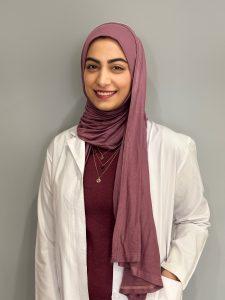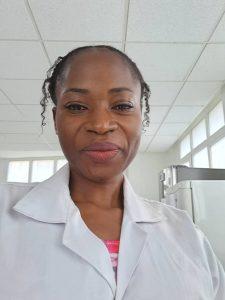April 2025
 My name is Maryam Sadat Seyedmehdi, and I am a recent master’s graduate in genetics. My journey into science began early in childhood, inspired by my father, a medical doctor and pathologist. Wandering around his lab, I was fascinated by the microscope and the mysterious world it revealed. Long story short, I chose Medical Laboratory Sciences for my bachelor’s degree, as a foundation in diagnostic science. Later on, my interest narrowed toward Genetics, which became the focus of my master’s studies. During this time, I became drawn to immunogenetics—a field that sits at the crossroads of genetics, immune science, clinical medicine, and computational biology.
My name is Maryam Sadat Seyedmehdi, and I am a recent master’s graduate in genetics. My journey into science began early in childhood, inspired by my father, a medical doctor and pathologist. Wandering around his lab, I was fascinated by the microscope and the mysterious world it revealed. Long story short, I chose Medical Laboratory Sciences for my bachelor’s degree, as a foundation in diagnostic science. Later on, my interest narrowed toward Genetics, which became the focus of my master’s studies. During this time, I became drawn to immunogenetics—a field that sits at the crossroads of genetics, immune science, clinical medicine, and computational biology.
We would love to hear more about your ongoing research. What projects are you currently working on, and how do they impact the field?
My latest work with Dr. Shirin Farivar focuses on identifying gene expression signatures and biomarkers of IDH-mutant gliomas, using transcriptomic datasets and integrative bioinformatics approaches. We tried to explore how tools like gene expression profiling and immune cell estimation can enhance early diagnosis. The goal was to better understand the molecular landscape of these tumours and potentially contribute to more personalised diagnostic or therapeutic strategies.
In parallel, I am also involved in collaborative efforts with Prof. Zahra Chavoshzadeh’s research group, a true gem in the field of IEIs in Iran at Mofid Children’s Hospital– a referral centre for Inborn Errors of Immunity. I’m engaged in ongoing studies on Leukocyte Adhesion Deficiencies (LADs), Congenital Disorders of Glycosylation (CDGs), and Combined Immunodeficiencies (CIDs). We also gather patient information to support registry activities and help build the infrastructure needed for future policy-making, research, and clinical decisions.
Please tell us about your work in gender equality in science in Iran?
The story of Gender Equality in Sciences began with a call for ideas from IUIS. After receiving a grant, a group was formed, which I later joined as part of the main team. Since then, I’ve been involved in several initiatives to support women in science in Iran. Over the past two years, we launched our own podcast and organized Women in Science Day events, with the support of Dr Mehrnaz Mesdagho. These events aim to celebrate the achievements of women scientists in Iran and promote equity and mentorship across generations. Our goal is to help women and girls recognise their strengths and believe in their potential. Our message is simple: there are no limits to how far you can go. With hard work, curiosity, and teamwork, growth will come. We want to build a space where women feel heard, can succeed, and lift others as they rise.
What inspired you to choose immunology as your focus within the field of science? Has this evolved over time?
My interest in immunology grew gradually, as I began to see how central the immune system is to many diseases. At the same time, my sister, Marjan, was studying immunology, and through her, I connected with people in the field. Interestingly, many of their discussions often circled back to genetics, which made me realize how closely the two areas are linked. Those conversations opened my eyes to the depth and impact of both fields and made it clear to me that this was the direction I wanted to pursue.
What specifically stood out about Immunopaedia that made you want to become an ambassador, and how has your experience as an ambassador affected you?
Being an Immunopaedia ambassador has given me the opportunity to connect with people who share the same passion—people from my scientific “tribe.”
Through this role, I’ve also had the opportunity to interview inspiring individuals, learn about their journeys, and hear their advice and experiences. It’s been a source of both motivation and growth, and I’m grateful for the platform Immunopaedia provides to young scientists like me.
Based on your own experience, what one piece of advice would you give someone who wants to study or research immunology?
My advice would be to embrace teamwork, stay curious, and be open to interdisciplinary approaches. Immunology today is closely linked with fields like data science, genomics, and artificial intelligence. Don’t hesitate to learn coding, explore databases, or connect with international communities. Also, focus on building a strong network and be patient—finding your niche takes time, but it’s definitely worth the effort.
Can you share a moment of unexpected joy or surprise in your scientific career over the past three years that has stayed with you?
As an early career professional and new to the field, last autumn I had the opportunity to attend ESID2024 in Marseille, France– a true highlight! It was incredibly inspiring to be surrounded by experts I’ve long admired. Meeting scientists like Prof. Luigi Notarangelo, Prof. Bodo Grimbacher, and Prof. Klaus Warnatz—whose names I had only seen on papers before—was a pleasure, a source of inspiration and a real honour.
Latest publications:
 March 2025
March 2025
Linda Djune Yemeli was highlighted as the Ambassador of the Month in July 2023. Linda has been a champ, contributing pre-course materials for many IUIS courses. We’re grateful that she joined our team! Linda is currently a final-year PhD Student at the University of Yaoundé 1, Cameroon and a visiting scholar at George Washington University, USA.
Read her previous interview – Ambassador of the Month – 2023
Please introduce yourself and tell us about your journey in immunology research since 2023.
I have completed all the requirements for my PhD, but I am still awaiting the public defence, which will likely be scheduled between May and June 2025. Since 2023, my journey in immunology research has been truly fascinating. In addition to completing my thesis, titled “Plasma Proteins and Cytokine Responses to Ivermectin Treatment of Loiasis,” I have undertaken several complementary training programs to enhance my knowledge of methodologies used in immunology research. This effort is aimed at making me more competitive for post-doctoral positions.
Last summer, I had the privilege of being part of the 2024 cohort for the prestigious Biology of Parasitism course organised by the University of Chicago in Woods Hole, Massachusetts. During the course, I particularly enjoyed the immunology module, where we explored mice’s innate immune response to Ascaris infection.
Currently, I am a visiting scholar at George Washington University, where I am gaining hands-on experience with experimental infections, multicolour flow cytometry, the Luminex platform, and other cutting-edge technologies used in immunology research
We would love to hear more about your ongoing research. What projects are you currently working on, and how do they impact the field?
Currently, I am involved in several projects, with a key focus on a study investigating the immunological mechanisms that drive the development of type-2 protective immunity during the acute phase of Ascaris infection. The findings from this research could pave the way for innovative strategies to manage and treat ascariasis and other related helminth infections.
What inspired you to choose immunology as your focus in the scientific field? Has this evolved over time?
My inspiration to focus on immunology came from an early fascination with Biology and infectious diseases. The dynamic balance between health and disease, especially in the context of infectious diseases, captivated my curiosity. This interest increased my master’s degree, where I was involved in a project exploring host-pathogen interaction during the coinfection of Plasmodium falciparum and Schistosoma mansoni.
Over time, my passion has evolved with my experiences. My PhD research on immune responses to ivermectin treatment in loiasis and my hands-on training in advanced immunological techniques have reinforced my belief in immunology’s power to address pressing challenges in parasitic infections. Additionally, being part of a project exploring Th2 immunity mechanisms during helminth infections over the past nine months has significantly broadened my understanding of how immune responses can be used to develop innovative control strategies.
Now, I see immunology not only as a field of intellectual pursuit but also as making a substantial impact on the lives of individuals affected by infectious and parasitic diseases.
What specifically stood out about Immunopaedia that made you want to become an ambassador, and how has your experience as an ambassador affected you?
What stood out to me about Immunopaedia and motivated me to become an ambassador is its invaluable role in advancing immunology education and research. The comprehensive pre-course material for IUIS courses provided by Immunopaedia ensures a strong foundational understanding, making complex topics accessible and engaging. Additionally, the platform’s “Breaking News” articles consistently keep me updated on the latest developments in immunology research, enabling me to stay informed about cutting-edge discoveries and innovations.
As an ambassador, this experience has been transformative. It has not only deepened my knowledge but also allowed me to connect with a global network of passionate immunologists. Being a part of this dynamic community has strengthened my communication skills and inspired me to contribute actively to promoting immunology education and awareness
Based on your own experience, what one piece of advice would you give someone who wants to study or research immunology in today’s scientific landscape?
The one piece of advice I would offer to anyone pursuing a career in immunology is to embrace resilience and celebrate every accomplishment, no matter how small. Like many scientific fields, immunology is filled with challenges; experiments may fail, hypotheses might be disproven, and progress can sometimes feel slow. Resilience allows you to navigate these obstacles, learn from setbacks, and keep moving forward with determination.
Equally important is taking the time to acknowledge and celebrate your achievements along the way, whether it’s mastering a new technique, publishing a paper, or even reaching milestones in your studies. These moments of celebration fuel your motivation, foster a positive outlook, and remind you why you chose this path in the first place.
Can you share a moment of unexpected joy or surprise in your scientific career over the past three years that has stayed with you?
One moment of unexpected joy in my scientific career is the incredible opportunity to train in Dr. Gazzinelli’s lab at George Washington University. Dr. Gazzinelli is not only an exceptional scientist but also an inspiring mentor. His guidance, expertise, and supportive approach have made this experience truly transformative. Working in his lab has provided me with valuable skills and insights while reinforcing my passion for immunology. It’s been a privilege to learn from such a remarkable mentor, and this experience will stay with me as I continue to grow in my career.
May we please have your most recent publications?
Linda Djune-Yemeli, Hugues C Nana-Djeunga, André Domché et al (2024). Delineation of high-risk areas for loiasis-related serious adverse events: uncertainties and implications of the predictions using clinical indicators. BMC Infectious Diseases. In Press.
Nana Djeunga, H.C., Akue, J.P., Efon Ekangouo, A., Djune Yemeli, L. and Kamgno, J., 2024. Diagnosis of Loa loa: From Blood Identification to Innovative Approaches. In Loa loa: Latest Advances in Loiasis Research (pp. 111-120). Cham: Springer International Publishing.
 February 2025
February 2025
Gaurang Telang has been an ambassador since 2022, we highlighted him as Ambassador of the Month in January 2022. He has been a great addition to the team contributing news, course content and interviews. We caught up with him 3 years later to see how his scientific career has progressed.
Please can you introduce yourself and tell us about your journey in immunology research since 2022?
I am Gaurang Telang, currently pursuing a PhD at Amity Institute of Biotechnology, Amity University Mumbai, while also working as a Laboratory Operations Manager at BioRadius Therapeutic Research Pvt. Ltd., Pune. My research focuses on T cell immunology, specifically investigating the effects of MAGE-A3 on T cell functionality and exhaustion in lung cancer.
Since 2022, my journey in immunology has been both challenging and rewarding. I have worked extensively with flow cytometry, primary cell culture, and immune cell functional assays to better understand T cell behaviour in the tumour microenvironment. Additionally, I have been involved in multiple collaborations, technical discussions with industry experts, and mentoring students in immunological research. Over the years, my focus has expanded from basic immunology to translational research, aiming to bridge the gap between fundamental discoveries and clinical applications.
We would love to hear more about your ongoing research now three years later. What projects are you currently working on and how do they impact the field?
Currently, my research is centred on three major objectives:
- MAGE-A3 and T Cell Activation: Investigating how MAGE-A3 influences early T cell activation markers and cytokine secretion.
- Memory and Exhaustion Phenotype: Studying MAGE-A3-specific T cell memory responses and its role in reversing T cell exhaustion induced by chronic stimulation.
- T Cell Cytotoxicity and Cancer Interaction: Assessing the functional impact of MAGE-A3-treated T cells on lung cancer cell lines, specifically their cytotoxic potential and tumour-killing efficacy.
These studies could provide insights into novel immunotherapeutic strategies targeting lung cancer by modulating T cell responses. If successful, they may contribute to the development of improved adoptive T cell therapies or cancer vaccines.
What inspired you to choose immunology as your focus within the field of science? Has this evolved over time?
My interest in immunology was sparked during my undergraduate studies when I first learned about the complexity and precision of the immune system. The idea that immune cells could recognize and eliminate cancerous or infected cells fascinated me. As I progressed in my career, I realized the vast potential of immunotherapy in treating cancers, autoimmune diseases, and infections.
Over time, my perspective has evolved from simply understanding immune responses to actively exploring ways to manipulate them for therapeutic benefits. Collaborating with patient-derived samples and tumour immunology models has deepened my appreciation for the challenges in the field and the need for translational approaches.
What specifically stood out about Immunopaedia that made you want to become an ambassador, and how has your experience as an ambassador affected you?
Immunopaedia stood out to me as a platform that effectively bridges knowledge gaps in immunology by making complex concepts accessible to students, researchers, and clinicians worldwide. The diversity of content—from foundational immunology to cutting-edge research—resonated with my passion for science communication.
As an ambassador, I have had the opportunity to contribute articles, conduct interviews with immunologists, and promote immunology education. This role has not only strengthened my understanding of the field but also connected me with a global network of experts and researchers. It has been a fulfilling experience to contribute to the dissemination of immunology knowledge and engage with a broader scientific community.
Based on your own experience, what one piece of advice would you give someone who wants to study or research immunology in today’s scientific landscape?
The field of immunology is rapidly evolving, and staying updated is crucial. My advice to aspiring immunologists is to cultivate a mindset of continuous learning and interdisciplinary thinking. Immunology intersects with genomics, bioinformatics, and even artificial intelligence, making it essential to explore beyond traditional boundaries.
Additionally, hands-on experience is invaluable – engaging in lab work, learning flow cytometry, and working with primary cell cultures can significantly enhance understanding. Lastly, networking with fellow researchers and mentors through conferences, workshops, and platforms like Immunopaedia can open doors to new opportunities and collaborations.
Can you share a moment of unexpected joy or surprise in your scientific career over the past three years that has stayed with you?
One of the most memorable moments in my career was when my first co-authored research paper was published. It was a significant milestone, marking the culmination of months of effort, troubleshooting experiments, and refining our hypotheses. Seeing our work recognized and available for the scientific community to read was incredibly fulfilling.
Another moment of joy was mentoring students in the lab and witnessing their growth in scientific thinking. Watching them develop their research skills, critically analyse data, and confidently present their findings has been one of the most rewarding aspects of my journey.
May we please have your most recent publications?
- Characterization and angiogenic potential of CD146 endometrial stem cells September 2024, Stem Cell Research & Therapy – http://dx.doi.org/10.1186/s13287-024-03918-7
- Comparative analyses of anti-inflammatory effects of Resveratrol, Pterostilbene and Curcumin: in-silico and in-vitro evidences May 2024, In Silico Pharmacology – (http://dx.doi.org/10.1007/s40203-024-00211-6)
- T Cell Exhaustion and Activation Markers in Pancreatic Cancer: A Systematic Review September 2023, Journal of Gastrointestinal Cancer – (http://dx.doi.org/10.1007/s12029-023-00965-w)
January 2025
 Karen Sichibalo holds a master’s degree in medical parasitology from the University of Zambia and is currently undertaking a PhD in immunology at the University of Lübeck in Germany. Her passion for immunology stems from a strong interest in understanding host-pathogen interactions and leveraging this knowledge to develop host-directed therapies that would strengthen the immune system while complementing conventional treatments in fighting HIV and tuberculosis. She is particularly drawn to how the field of immunology offers endless opportunities to uncover various mechanisms underlying disease and how these insights can be used in therapeutic approaches including vaccine design.
Karen Sichibalo holds a master’s degree in medical parasitology from the University of Zambia and is currently undertaking a PhD in immunology at the University of Lübeck in Germany. Her passion for immunology stems from a strong interest in understanding host-pathogen interactions and leveraging this knowledge to develop host-directed therapies that would strengthen the immune system while complementing conventional treatments in fighting HIV and tuberculosis. She is particularly drawn to how the field of immunology offers endless opportunities to uncover various mechanisms underlying disease and how these insights can be used in therapeutic approaches including vaccine design.
We would love to hear more about your ongoing research. What projects are you currently working on and how do they impact the field?
My PhD research focuses on the potential benefits of high-dose vitamin D3 supplementation on innate immunity and antimycobacterial responses in adolescents living with perinatally acquired HIV-1 in Zambia. The aim is to ascertain whether vitamin D3 can be used as immunomodulatory adjuvant therapy to complement ART and reduce the incidence of microbial infections and ameliorate immune exhaustion in this cohort. We intend to ascertain this through a 96-week randomized double blinded placebo-controlled clinical trial, called VITALITY, where 400 adolescents living with HIV in Zambia received a biweekly supplementation of 20,000 IU vitamin D3 and 500 mg daily calcium carbonate (Trial ID: PACTR20200989766029). We intend to assess how vitamin D3, as a host-directed therapy, enhances neutrophil and monocyte effector functions such as phagocytic capacity and oxidative burst as well as microbial killing capacity and how it impacts chemo-/cytokine regulation in this cohort.
For resource-limited settings such as Zambia and most parts of the sub-Saharan region where HIV is a huge burden, vitamin D3 presents us with a scalable cost-effective adjuvant therapy to complement ART. Additionally, vitamin D supplementation in especially severely deficient individuals could potentially translate into reduced cases of antimicrobial resistance, in that, these individuals would be able to mount sufficient immunological responses against microbial infections. Consequently, this would ultimately reduce the use of antibiotic-dependent approaches to combat bacterial infections.
Another research project I am working on is exploring the crosstalk between gut microbiota and innate immunity in healthy adolescents and those living with HIV-1. Of note is that adolescence is a critical transitional phase in which the innate immune system undergoes maturation and becomes more robust at recognizing and killing pathogens. Significant changes in the gut microbiome composition also occur during this stage. Additionally, the innate immune system is the body’s first line of defence against pathogens and it shares a close relationship with the gut microbiota. Therefore, unravelling the crosstalk between innate immune reactivity and the gut microbiota may help us understand how gut microbiota profiles regulate the innate immune system and how this shapes disease outcomes. In this study, we hypothesize that the gut microbiota modulates innate immune responses and inflammation, potentially shaping long-term health outcomes as these adolescents transition into adulthood, with distinct differences between healthy individuals and those living with HIV.
There are many areas of science, what inspired you to choose immunology over other branches of science?
The blend of complexity that comes with immunology and its clinical impact as well as potential for transformative discoveries makes it one of the most exciting and rewarding fields to pursue. When it comes to global health, immunology is at the heart of combating pandemics and emerging infectious diseases. It plays a cardinal role in understanding the various disease mechanisms and informs the development of respective vaccines and immunotherapies. Besides, immunology is an everyday relevance because the immune system is at work every single day! Understanding immunology empowers an individual to make informed decisions about their health, from appreciating how nutrition and lifestyle impact immunity to understanding the science behind vaccines and why they are important.
What specifically stood out about Immunopaedia that made you want to be an ambassador?
Immunopaedia provides an excellent platform that promotes networking/collaborations amongst young and upcoming immunologists in Africa and across the globe. It also facilitates additional learning through the different immunology modules available on the Immunopaedia website. I appreciate the fact that these modules have been categorized into specific fields i.e. HIV/AIDS, tuberculosis, COVID etc., that particularly makes them relevant based on an individual’s field of study.
Based on your own experience, what one piece of advice would you give someone who wants to study/research immunology?
To be open-minded! Immunology is a multidisciplinary science that intersects various fields, including microbiology, genetics and bioinformatics. This integration fosters innovation and novel discoveries. It is also important to understand that negative results either from a clinical trial or in vitro experiments are still valuable. They not only explain differences in experimental conditions but most importantly help highlight differences across study populations that may ultimately warrant further study.
What has been a moment of unexpected joy or surprise in your scientific career that has stayed with you?
My greatest awe in my scientific journey is that, while many scientific disciplines play crucial roles, Immunology lies at the heart of understanding and combating diseases.
Karen Sichibalo’s recent publications:
Dzavakwa, N.V., Chisenga, M., McHugh, G., Filteau, S., Gregson, C.L., Kasonka, L., Kranzer, K., Mabuda, H.B., Mujuru, H., Redzo, N., Rowland-Jones, S., Schaible, U.E., Simms, V., Ferrand, R.A., the VITALITY team*, 2024. Vitamin D3 and calcium carbonate supplementation for adolescents with HIV to reduce musculoskeletal morbidity and immunopathology (VITALITY trial): study protocol for a randomised placebo-controlled trial. Trials 23, 78. (https://doi.org/10.1186/s13063-024-08342-z.).
Karen Sichibalo*, Katendi Changula , Chisoni Mumba , Natasha Mwila , Kennedy Chibesa, Benjamin Mubemba, King S. Nalubamba, Walter Muleya, Edgar Simulundu , Simbarashe Chitanga. (2021). Acaricide Resistance in Rhipicephalus and Amblyomma Ticks (Acari Ixodidae) in Namwala, Zambia. ( https://doi.org/10.53974/unza.jabs.5.3.668).










